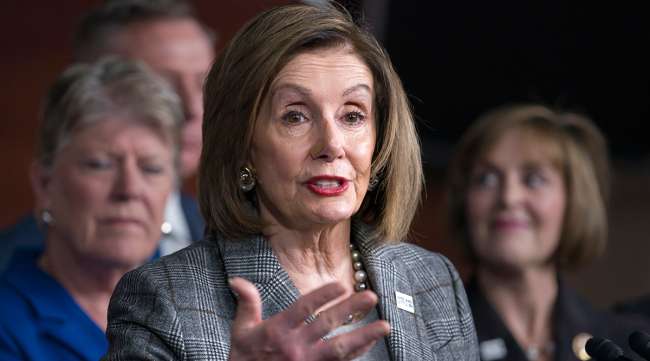Pelosi, White House Have Tentative Deal on USMCA

[Stay on top of transportation news: Get TTNews in your inbox.]
The Trump administration and House Democrats have a tentative deal on the U.S.-Mexico-Canada trade agreement, according to people familiar with negotiations, paving the way for congressional approval as early as this month even as Democrats prepare to impeach the president.
Speaker Nancy Pelosi is reviewing changes to the agreement that U.S. Trade Representative Robert Lighthizer and his Mexican counterpart Jesus Seade have put on paper over the past week.

Lighthizer
And now it appears President Trump has secured approval from the largest labor federation in the U.S, according to three Trump administration officials, clearing one of the final hurdles for the deal to get a vote in Congress as soon as next week.
Richard Trumka, the president of the AFL-CIO, will support a compromise deal on the trade pact, the officials said.
The revision of the North American Free Trade Agreement is one of Trump’s top priorities, and its passage would help the White House make the case that he’s pursuing policy achievements on behalf of the country even while lawmakers debate removing him from office. At the same time, a deal would show that Democrats can legislate while also investigating the president’s administration.
“I’m hearing a lot of strides have been made over the last 24 hours with unions and with others,” Trump told reporters Dec. 9. “I’m hearing very good things. I’m hearing from unions and others that it’s looking good, and I hope they put it up to a vote.”

Seade
Lighthizer and Seade exchanged proposals on labor inspection rules and tougher steel provisions and finished a compromise package late Dec. 6 that they submitted to Pelosi, the people said. A demand from the U.S. regarding steel and aluminum, which people briefed on the talks said came from the United Steelworkers union, threatened to stall the negotiations last week.
In a change of plans Dec. 9, Seade stayed in Mexico rather than returning to Washington to meet with Lighthizer again, according to three people familiar with his plans.
Mexican President Andres Manuel Lopez Obrador said earlier Dec. 9 that he expects a decision from the U.S. on the agreement very soon.
“Now is the time to vote on it,” Lopez Obrador said Dec. 9. “I am optimistic we can reach a deal.”
Seade and Foreign Minister Marcelo Ebrard plan to update reporters on advances in the negotiations later on Dec. 9, the ministry said.
While all parties are still reviewing the deal, representatives from the three countries are already discussing where to have a signing ceremony, according to one person familiar with the matter.

Trumka
Trumka spoke with Trump before Trumka briefed the labor group’s executive committee meeting at 2 p.m. EST, according to two other people familiar with the matter.
Pelosi last month cautioned that even with a deal, there might not be enough time to vote on the agreement this year, reminding her members that “in a world of instant gratification,” legislating takes time.
There are still a number of procedural hurdles before the agreement can come to the floor for a vote, including committee hearings and review of the implementing bill in the House Ways and Means and Senate Finance committees. Those steps could be waived to save time, though, and people familiar with the talks said lawmakers are likely to skip some of them.
Democrats from rural, swing districts are especially eager to get a deal done. Farmers have faced devastating economic losses this year because of the trade war with China, although the president has blamed some of that on the delay in getting the USMCA approved.
The U.S. International Trade Commission, an independent government panel, in an April analysis said USMCA would boost the U.S. economy by 0.35% and lead to 176,000 new jobs in the sixth year after implementation, a small addition to the 132 million people employed full-time in the U.S.
Leaders of Canada, Mexico and the U.S. signed the agreement more than a year ago and the White House and Democrats have spent months locked in tense negotiations over four key areas: environment, labor commitments, drug-patent protections and enforcement mechanisms. In recent weeks, the discussions have focused on the deal’s labor enforcement.
One of the main sticking points was a Democratic proposal to enforce labor rights by allowing products from factories accused of violations to be inspected and blocked at the U.S. border. California Rep. Jimmy Gomez, a member of the House Democratic negotiating team, said last week that Pelosi and
Lighthizer have offered Mexico a compromise on labor enforcement that “respects Mexico’s sovereignty.”
Republicans and the business community increased pressure on Pelosi as they grew concerned that time was running out for a vote in 2019, believing it would be difficult to hold a vote in an election year. Pelosi said she wouldn’t rule out a vote in 2020, although she said her preference would be to get it done sooner.
Key to reaching a deal has been neutralizing any opposition from the largest U.S. union confederation, the AFL-CIO.
Trump and his advisers tout USMCA as the best agreement ever negotiated for unions and Democrats, particularly the deal’s labor provisions and stricter auto-content rules that they say would boost U.S. manufacturing.
Want more news? Listen to today's daily briefing:

